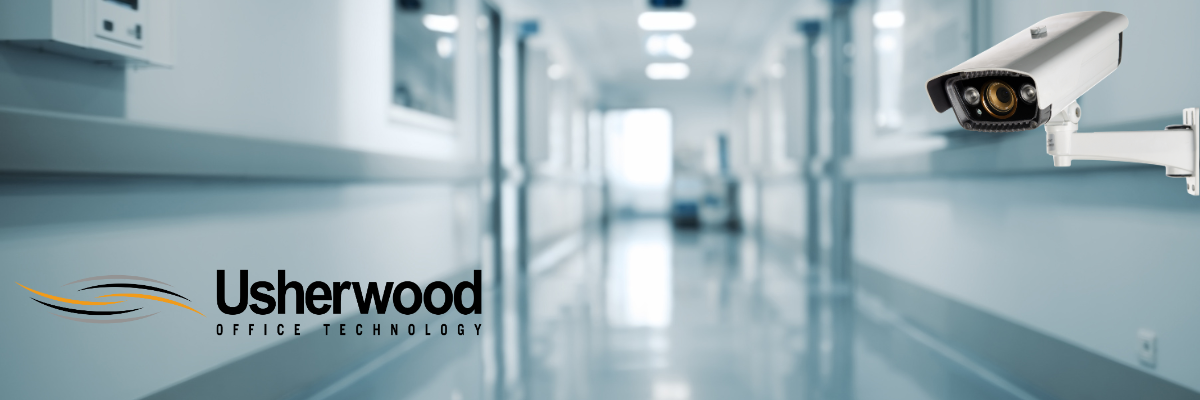By: Jada Sterling, Digital Content Manager on June 19th, 2024
HIPAA and Surveillance Cameras: When Does it Cross a Line?
If you work in the healthcare industry, you’re likely aware of the risks that doctors, nurses, and staff take on when doing their jobs every day. Aggressive patients, theft, malpractice, and other security issues make adequate security and surveillance systems a major necessity in any healthcare setting.
However, you may wonder if modern commercial security systems violate HIPAA protections for patients. After all, modern security cameras can detect faces, tiny details, coloration, and audio in increasingly advanced quality. So, is it a HIPAA violation to record patients, and how do you protect patient protected health information (PHI) from getting into the wrong hands?
Are Security Cameras a HIPAA Violation?
As you might have guessed, security cameras are not inherently a HIPAA violation since they are meant to protect healthcare organizations and staff.
However, there are some ways they can cross the line of HIPAA, so you must tread carefully when installing, configuring, and monitoring cameras and footage.
Do All Hospitals Have Surveillance Cameras?
Every hospital or healthcare business likely utilizes security cameras in some capacity. In accordance with HIPAA, video surveillance must meet certain criteria to protect sensitive data. Healthcare surveillance is often used to:
- Monitor staff and ensure proper conduct
- Protect staff from violent or unruly patients or visitors
- Gather footage for educational or research purposes
- Quality control to enhance patient care
What Types of Incidents Can Lead to a HIPAA Security Breach?
There are many ways video surveillance can cross the line and violate data protection regulations. Your surveillance compliance comes down to aspects like access control, proper data and device management, and cybersecurity.
Different incidents with security systems that can lead to data breaches or HIPAA violations include:
- Video monitors placed in unsecured public areas where passersby can view procedures
- Footage being improperly stored or disposed of
- Cameras and other surveillance devices being discarded irresponsibly
- Unauthorized access of footage containing identifiable procedures, faces, etc.
- Cyber threats such as ransomware that could shut down or commandeer security cameras
How To Know If Your Healthcare Network Endpoints Are Secure
According to a study by IDC, 70% of data breaches originate from network endpoints, or any devices or tools that connect to your network. Security cameras are no exception, so their security is a critical aspect of protecting HIPAA-protected data collected by hospital cameras.
Sometimes, misconfigured or outdated security cameras can pose cybersecurity issues for healthcare facilities. The sensitive security issues in healthcare make it one of the biggest targets for hackers.
Many healthcare IT security companies can help you secure your endpoints to mitigate the risks of this kind of breach. To read more about healthcare cybersecurity, check out our blog: Is Cybersecurity Really That Big of a Deal In Healthcare? Risks of Healthcare Data Breaches
How To Make Hospital Cameras HIPAA-Compliant
HIPAA covers more than identifiable health records, names, and other data. It extends to patient faces, voices, and other biometric identifiers such as fingerprints.
For this reason, it’s important to protect footage that could be used to expose patient information. To comply with HIPAA, security cameras must be managed properly by doing things like:
- Blurring faces, records, and disabling audio whenever possible
- Ensuring video monitors are placed only in restricted areas inaccessible to the public or unauthorized individuals
- Strategically placing cameras so they are only used to monitor staff activity and safety rather than capture sensitive information
- Create policies for the management, configuration, and disposal of security devices and footage
- Adequately train staff on proper installation, use, and storage of security systems and video footage
These measures will allow you to keep your staff and premises safe while protecting your patient data from unauthorized individuals.
Invest in Security and IT Solutions to Ensure Compliance and Safety in Your Healthcare Setting
It may seem like a headache to manage a security system that adequately protects patient privacy while protecting and monitoring the facility. However, there are specialized services out there to help you with these challenges.
If you’re interested in designing a security strategy that satisfies your business’s needs while complying with HIPAA, click the button below to speak with an experienced security expert.
Read On

Is Cybersecurity Really That Big of a Deal In Healthcare? Risks of Healthcare Data Breaches
If your small to medium-sized healthcare clinic uses digital records, odds are you may be at risk...

The Ultimate Guide to Data Security in Healthcare
Healthcare is an industry often plagued by cyber threats since hackers know the sensitivity of...

Your Ultimate Guide to Manufacturing Security Camera Systems
If you manage a manufacturing business, you likely know the importance of maintaining productive,...




